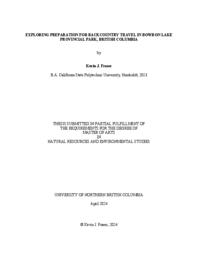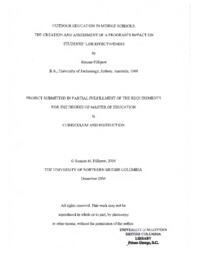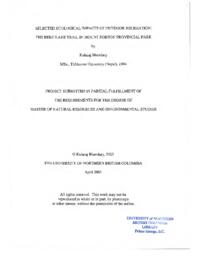Shultis, John
Person Preferred Name
John Shultis
Related Works
Content type
Digital Document
Description / Synopsis
Outdoor recreation trips have long been conceptualized as relatively linear multiplephased experiences. Previous studies of recreational activities and visitor experiences in backcountry settings have largely focused on the onsite phase. This study, however, explored the nature and elements of preparation and its influence on the backcountry experiences and meanings, as recollected by participants. Secondarily, this project aimed to better understand the roles of technology in preparation. The study used semi-structured interviews with participants who had completed one or more canoe or kayak trips in Bowron Lake Provincial Park in British Columbia, a world-renowned backcountry canoe circuit. Findings indicate that preparation is an ongoing process comprised of multiple elements by which participants are involved throughout all phases of an outdoor experience. Preparation can help improve safety and satisfaction during backcountry experiences and has important implications for recreation and leisure programs and practices, parks and protected areas management, and outdoor education. Conceptually, the research suggests that preparation is not as linear or time-bound as the five-phase model would suggest. Rather, aspects are ongoing throughout and between trips, accrued with mentorship and training over the course of a career, and involve elements of tasks and efforts beyond simply ‘planning’ trip logistics.
Origin Information
Content type
Digital Document
Description / Synopsis
In the last 40 years, neoliberalism has become the dominant political economy, guiding not only global economies and politics, but also every other aspect of contemporary life, including the management and planning of national parks and equivalent reserves, and global conservation goals and objectives. Despite a growing body of academic research on the impacts of neoliberal conservation, there is still a need for studies that explore the issue from a comparative, international perspective and examine its different repercussions on nations with different historical, social, and geographical contexts. An interdisciplinary approach, combining the data analysis methods of critical discourse analysis, Foucauldian discourse analysis and historical institutionalism was used to perform a comparative case study between national park systems in Canada and Brazil. The research identified the main path dependencies, as well as the periods of stability, and internal and external aspects that shaped the national park systems in both countries. Discourses used to promote or resist the adoption of market-based instruments and other neoliberal policies were also identified and grouped into three larger discursive formations: 1) Public funding is the ideal model for national parks; 2) There is no alternative to the market for national parks; and 3) The market is the best solution for national parks. The results suggested a double standard between Canada and Brazil related to their position in the world-system as core and peripheral nations. Discourses were used to promote neoliberal policies as the best and only solution for national parks, but the external and internal pressure for their implementation was more geared towards peripheral countries while core countries had more power to decide which policies would be adopted. Foucauldian discursive strategies were used to provide an alternative way to understand how core nations and international organizations work to control the discourses that are available to peripheral countries.
Origin Information
Content type
Digital Document
Description / Synopsis
Biocultural approaches to conservation include the protection and appreciation of other ways of knowing the environment. Studies in traditional resource management systems illuminate the intricate ways culture has coevolved with nature and provide opportunities to incorporate alternate perceptions of the environment into conservation objectives. This thesis examines how traditional resource management systems contribute to biocultural conservation using a case study for the relationship between Tr’ondëk Hwëch’in First Nation, caribou and Tombstone Territorial Park. Core beliefs about the natural world, including caribou, are central to the strategies Tr’ondëk Hwëch’in employ in resource management. While cultural values and First Nation rights are engrained in park management, a broader understanding of how Tr’ondëk Hwëch’in know the natural world is lacking.
Origin Information
Content type
Digital Document
Origin Information
Content type
Digital Document
Origin Information
Content type
Digital Document
Origin Information
Content type
Digital Document
Origin Information







